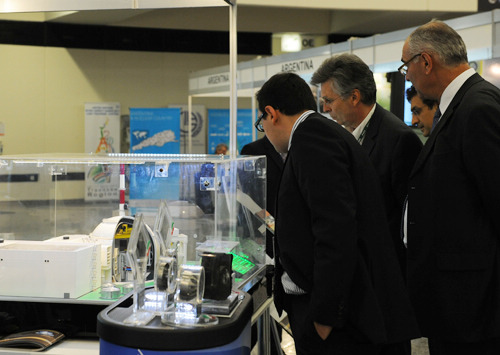|
 |
|
ALTERNATIVE ENERGY: Visitors look at a nuclear power plant model at the Iranian booth during an international nuclear industry exhibition in Vienna on September 19 (XU LIANG) |
The West accuses Iran of developing nuclear weapons without valid evidence. For instance, in 2005, a U.S. intelligence agency said Iran was making nuclear bombs. Two years later, however, reports from other U.S. intelligence agencies showed Iran didn't restart its nuclear weapon program after it was halted in 2003.
Actually, the nuclear issue is not the only point of contention between Iran and Western countries. A more essential problem between them lies in the clash of ideologies and security outlooks. After the Islamic Revolution of 1979, the relationship between Iran and the Western world deteriorated rapidly. Iran was called a "rogue state," and former U.S. President George W. Bush included Iran in the "axis of evil." Western countries also rebuked Iran for supporting and training terrorists. They even thought the current Iranian regime itself poses a major threat to their interests. Therefore, the United States and other Western countries have tried to politically isolate Iran, cripple its economy with sanctions and support anti-government elements within Iran. For its part, Iran has denounced the United States as the "Great Satan" and the root of all evil in the world.
For the United States and other Western countries, Iran has become the biggest obstacle for the United States to control the Middle East after wars in Afghanistan and Iraq and the overturn of Muammar Gaddafi in Libya. There is no doubt that Western countries will take further actions to suppress Iran.
The United States broke off diplomatic relations with Iran in 1980. By containing Iran, it intends to deter other anti-American forces and retain its dominance in the Middle East and beyond.
The UK, France and Germany have worked in concert with the United States on the issue not only because they are allies of the United States, but also because they want to assert their presence in the Middle East. Germany, in particular, as the only non-permanent member of the UN Security Council participating in discussions about the Iranian nuclear issue, attempts to achieve great power status by being active in the dispute.
In a recent annual report of the U.S.-China Economic and Security Review Commission for the U.S. Congress, a panel of U.S. experts claimed China undermines international efforts to force Iran and North Korea to quit their nuclear programs. The United States and China are both significant powers in the world. There is no doubt that the two countries have much to do in cooperation with each other in fields such as environmental protection, antiterrorism, safeguarding world peace and promoting economic growth of the world. But to conclude from this that China should follow U.S. foreign policy would be ridiculous and ignorant.
Unlike those Western countries that follow the United States, China has its own independent foreign policy. In general, China pursues a foreign policy for peace. It insists on building a "harmonious world" based on the Five Principles of Peaceful Coexistence and resolving international disputes and conflicts through negotiations and consultations. China deals with all international issues on the basis of these principles.
China has always opposed the proliferation of nuclear weapons. It disapproves of any attempt to develop nuclear weapons in the Middle East. U.S.-led Western countries, however, hold double standards. They have imposed sanctions on Iran and even threatened to launch military attacks on the country, while giving tacit consent to Israel's nuclear weapon programs. The practice has drawn wide criticism from other Middle Eastern countries. That is also a primary reason why a nuclear-weapon-free zone in the Middle East, which was proposed in the 1960s, has yet to materialize.
China stands against the expansion of sanctions on Iran and calls for resolving the Iranian nuclear issue peacefully through dialogue and cooperation. It believes dialogue between the six major powers—the five permanent members of the UN Security Council plus Germany—and Iran and cooperation between Iran and the IAEA can provide a comprehensive, proper and long-term approach to resolve the issue. China's stance on nuclear non-proliferation is consistent. This is the greatest difference between the policies of China and Western countries. China's policy is not only in line with the interests of Middle Eastern countries but also conforms to mankind's common goal of maintaining world peace.
The author is a research fellow with the Institute of West Asian and African Studies at the Chinese Academy of Social Sciences | 